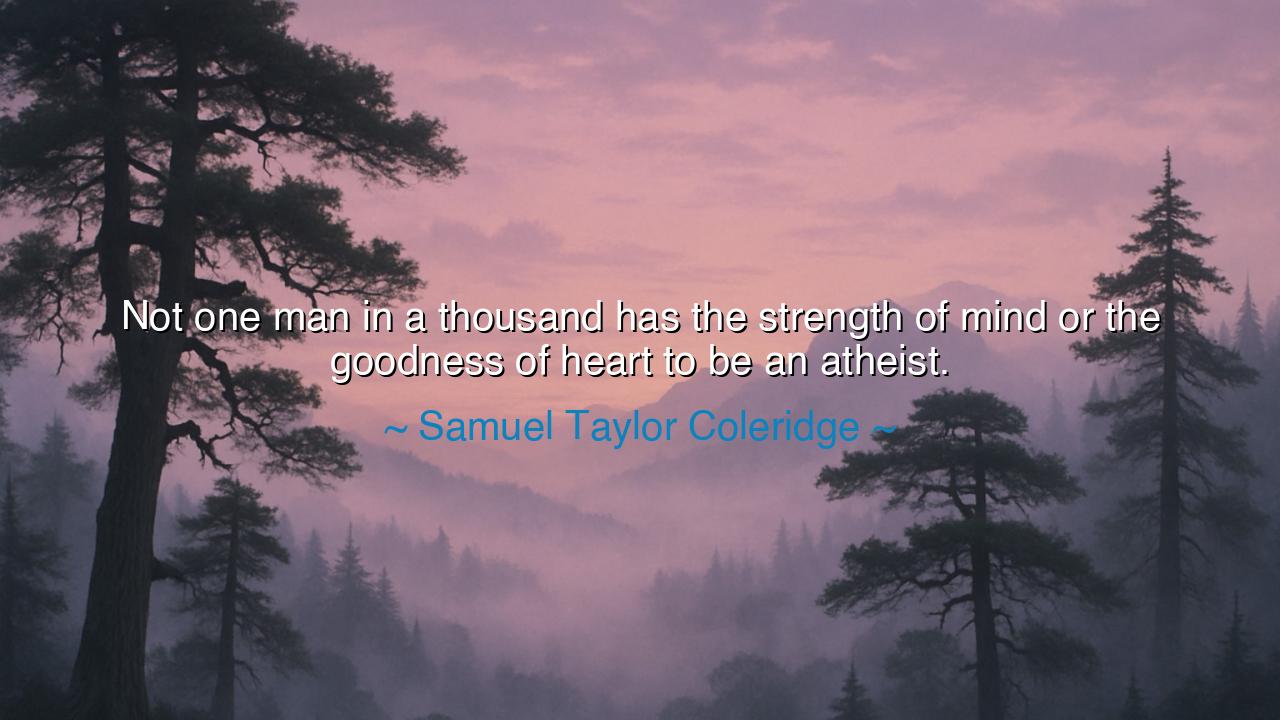
Not one man in a thousand has the strength of mind or the
Not one man in a thousand has the strength of mind or the goodness of heart to be an atheist.






Samuel Taylor Coleridge, poet and philosopher of the Romantic age, once declared with force: “Not one man in a thousand has the strength of mind or the goodness of heart to be an atheist.” At first hearing, these words sound like a challenge, even a rebuke, yet within them lies a profound meditation on the weight of belief, doubt, and the moral courage required to live without the consolations of faith. Coleridge, who himself wrestled with faith and philosophy all his life, did not speak lightly. He knew that to deny God was not merely an act of the lips, but a burden of the soul requiring immense strength of mind and unfailing goodness of heart.
The meaning of his words lies in the enormity of what it means to live without belief in a higher power. For the believer, suffering can be borne with the hope of justice beyond the grave, and death is softened by the promise of immortality. But for the atheist, no such refuge exists. To live honorably in such a world demands courage of intellect—to accept a universe without ultimate answers—and purity of heart—to act with virtue, knowing there is no eternal reward nor divine punishment. Thus Coleridge suggests that very few men are capable of bearing such a weight, for it strips away the comforts that sustain most of humanity.
The origin of this thought emerges from Coleridge’s lifelong struggle with doubt and belief. He lived in an age when Enlightenment reason challenged ancient faith, and new philosophies sought to dismiss religion as myth. Yet Coleridge, while drawn to philosophy, remained deeply spiritual. He saw that many who claimed unbelief did so not from true philosophical conviction, but from pride, bitterness, or moral neglect. To him, a true atheist—one whose strength of mind was disciplined enough to face existence without illusion, and whose goodness of heart was great enough to live virtuously without fear of divine judgment—was a rarity indeed.
History gives us glimpses of such rare souls. Consider Marcus Aurelius, the Stoic emperor of Rome. Though not atheist in the modern sense, he sought to live by reason and duty without leaning heavily on promises of divine favor. His meditations reveal the courage to act justly for justice’s sake, even in the face of mortality. Or think of Jean-Paul Sartre in modern times, who bore the weight of an atheistic philosophy and insisted that man must create meaning through his own actions. Whatever one thinks of his conclusions, such a stance demands uncommon intellectual bravery and moral responsibility. These figures illustrate Coleridge’s point: such men are rare, for most souls shrink from such naked responsibility.
The imagery here is evocative: a thousand men stand in the crowd, yet among them, perhaps one has the iron of mind and the gold of heart to be true to atheism. The others may doubt, may waver, may proclaim disbelief with their lips, but lack either the discipline of thought or the purity of virtue to live consistently with such a creed. In Coleridge’s view, atheism is no casual declaration, but a path requiring heroic self-mastery.
The lesson for us is not simply about atheism or belief, but about the depth of conviction itself. Whether one believes or doubts, the call is the same: live not superficially, but with integrity. Do not wear philosophies as ornaments, but carry them as living truths, tested by the fire of daily life. If you profess faith, let your actions prove it. If you doubt, let your virtue shine brighter for the absence of promised reward. Coleridge reminds us that true conviction—whether of belief or unbelief—requires discipline of mind and purity of heart.
Practically, this means examining ourselves honestly. Do we hold our beliefs, or lack thereof, from reasoned reflection and moral seriousness, or from habit, rebellion, or indifference? Do we live consistently with the truths we claim, or do we falter in hypocrisy? Strive, therefore, for the strength of mind to think deeply and the goodness of heart to act rightly, whatever your creed. For in the end, Coleridge calls us not to easy slogans, but to the hard labor of living with integrity.
So let his words echo as ancient counsel: “Not one man in a thousand has the strength of mind or the goodness of heart to be an atheist.” Whether you walk in faith or in doubt, let your path be one of courage, discipline, and virtue. For the rarest strength is not in what we declare, but in how we live. And in that truth, we find the measure of every soul.






AAdministratorAdministrator
Welcome, honored guests. Please leave a comment, we will respond soon